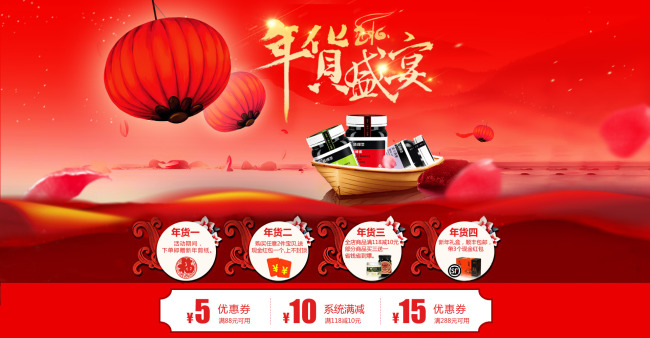Xiaohongshu was taken off the shelves for one month in the application store. Does it affect users and brands?
Xiaohongshu was taken off the shelves for one month in the application store. Does it affect users and brands?
Weibo social media crisis learning from Sesderma in China
With almost 400 million monthly active users by the end of 2017 on Weibo, without a doubt, every foreigner brand would consider Weibo as an important social media channel to build up awareness in China. We can imagine if one brand could appear on the top search topics, it may be because they have successfully created a big issue, but on the other hand, the popularity maybe also comes from unexpected negative feedbacks which a small issue could turn into a serious PR disaster in the blink.
We can always learn from other’s case and prepare tailored social media crisis management for our own brand in advance, and this time we learn from Sesderma’s experience.
Sesderma hit No.27 on the Weibo top search topics
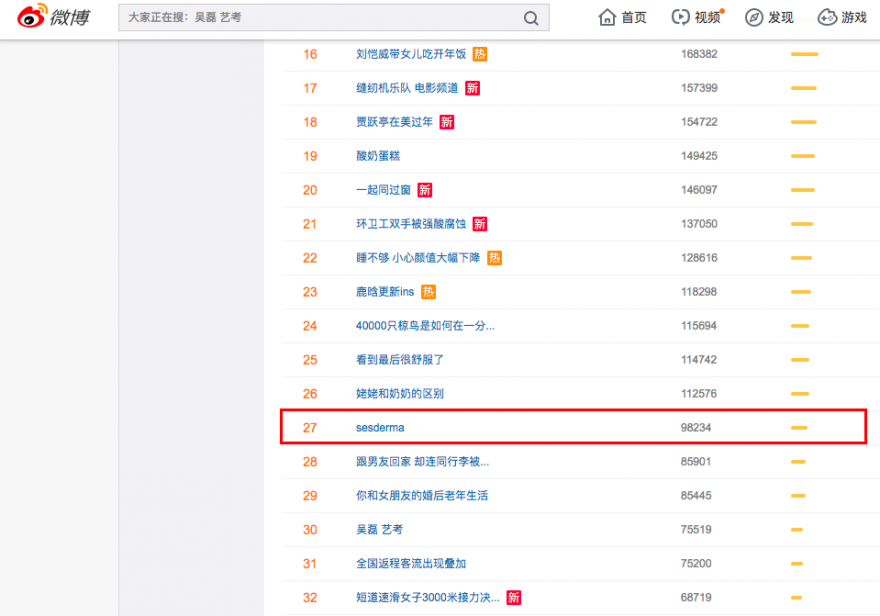
On the daily social media monitoring, we found that Sesderma, the well-known Spanish dermocosmetics brand was on the hot search list on Weibo, but they were dealing with the crisis out of a careless mistake in China. Their account has more than 7,000 fans, but the brand name search volume was 14 times more, we can assume the negative news brought in lots of people who aren’t familiar with the brand Sesderma before. What caused the PR crisis exactly? Let’s get back to where the issue started.
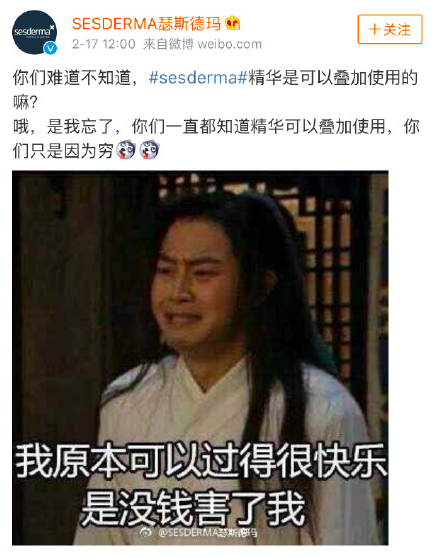
2/17 12 pm: Sesderma’s controversial post
Their intention was to educate the fans how to apply their product for a better result and created the post in a soft and self-deprecating way, but the critical part is they said “you” are poor and “you” don’t have money, so they misled the perspective and turned out to discriminate against the fans. Unfortunately, since then, the post started to accumulate passive comments in a quick-speed.
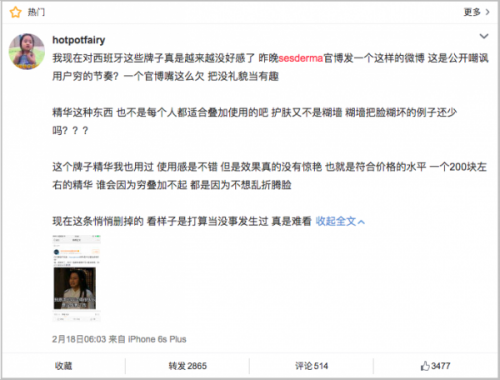
2/18 6 am: One user posted the negative feedback about Sesderma’s post (share:2,865 / comments:514 / likes:3,477)Not only the improper content, but the way Sesderma managed the issue. The user found Sesderma directly deleted the original post and without responding to fans’ anger. The post just went viral afterward, and it easily pushed Sesderma on the hot search list on Weibo.
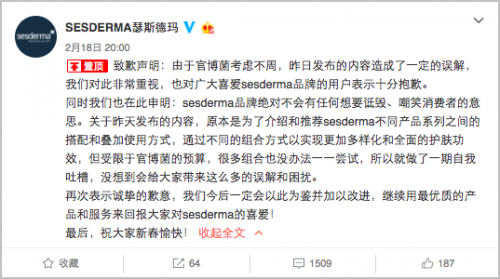
2/18 8 pm: Sesderma apologized sincerely to their fans
After waiting for more than one day, Sesderma had an official post to apology for their careless mistake. According to the comments, most of the fans could accept and left their support notes, but Sesderma continued to occupy the hot search topic position, until late afternoon on 2/20. Social media crisis comes easily, but it’s definitely hard to disappear.
3 takeaway to prepare crisis management on social media in China
1/Respond timely and as long as the mistake is confirmed, a sincere apology and open communication is needed
In many cases, actually, the crises are avoidable, if we can manage the potential crisis timely, and organize the crisis management team if necessary with members from involved departments, to create a open dialogue with fans within 24 horas.
2/Self-deprecating humor is easily taking over on social media, but extra care and attention for this kind of content is crucial
Sometimes self-deprecating humor is delicate, it’s better the content can be viewed and checked by different people to taste the respond. And keep the first person perspective clearly through whole content, as we can see in the Sesderma’s case, as long as you change the perspective, self-deprecating post could backfire quickly.
3/Chinese local team represents the foreign brand in China, so it’s important to work closely with headquarter to deliver the brand value
Even though many foreign brands have local subsidiary or agency to execute all the Chinese market marketing communications in China, but work integrally and have regular meeting is essential to keep both parts on the same track towards the ultimate success.
If you are interested in developing business in China through online marketing and e-commerce, 2 Open are glad to listen to you, please feel free to contact us by e-mail: INFO@2OPEN.BIZ, or just leave us a message below, we will get back to you as soon as possible.
A six-step strategy to find Blue Ocean for eCommerce in China
In previous years, this type of products was very easy to find, and it was relatively easy to set up a new product line. However nowadays, eCommerce is becoming more and more popular in China. Thus, it is more and more difficult to find Blue Ocean products without extensive data mining. Now, let’s look at a six-step strategy to find Blue Ocean for eCommerce in China.
WeChat “Mini Program” Opens a New Door to Chinese eCommerce

China’s Tencent WeChat has already become far more than a social networking platform for Chinese people. Users can order food or a taxi, book a hotel, purchase a flight ticket, etc. all through WeChat’s “Wallet” feature. Now, another powerful new feature, “Mini Program” keeps users within WeChat ecosystem even longer.
What Is “Mini Program”? What Functions Does It Have?
Mini Program is a mobile phone application that can be used without downloading and installation. This feature essentially offers miniature, low-memory “apps” within the WeChat app itself. You can open Mini Programs immediately by scanning a QR code, or by searching it. Because it embodies the idea of “use as you go”, Mini program will be ubiquitous, available at any time,
There are various mini programs that help you to achieve different functions, which allow users for online shopping and a wide range of other offline services. For example, purchase movie tickets, queue for restaurants, order a meal, checking stock market information, hotel booking, use Mobike, order a taxi, purchase flight tickets, online shopping, etc. Some of the top mini programs are those that share discount coupons, create surveys, track bus schedules, check best prices, check air quality, and filter photos.
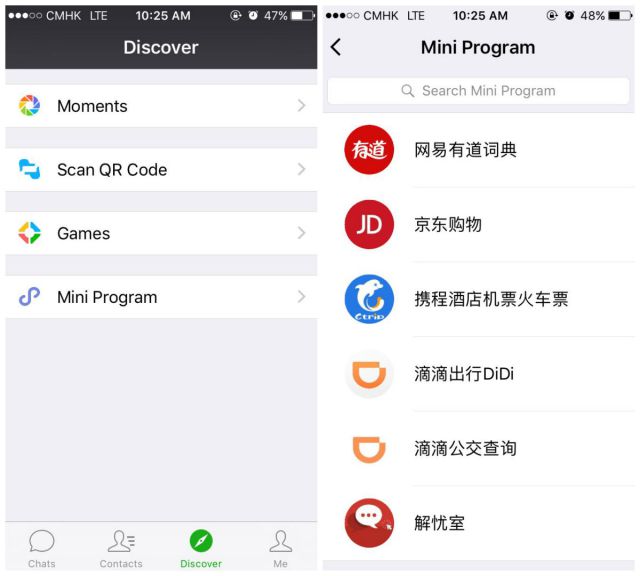
What Can We Get From Mini Program?
From Users Perspective:
1. Suitable for low frequency services. Users open Mini Programs while using the service, and switch it off upon finishing. It doesn’t occupy the memory of mobile phone. This characteristics of “use as you go” satisfies users’ need on many low frequency services, such as buying tickets and hotel booking.
2. The off-line value of Mini Programs is noteworthy. Because the demand for off-line service is “quick”, “flexible”, “use it and drop it“. For example, ordering dishes in restaurants by simply scan a QR code. You can access to their Mini Program to start ordering immediately. No need to wait for the waiters coming to your table.
3. Satisfy personalised requirement in special scenarios. For example, Using Mini Program to watch movies, without the trouble of downloading different video players mobile APP each time. Therefor, the user experience is not broken.
From A Business Perspective:
The real value and purpose of mini programs is in advancing O2O transactions and interactions, essentially connecting WeChat and the real world in more effective ways. Taking restaurants as an example, it is relatively unrealistic for restaurant owners to make a mobile APP. Now consumers only need to scan a QR code, so they can access Mini Programs, to instantly see menu, and start ordering and paying for their bill. Moreover, By tracking users consumption data, it also allows business owners to easily understand users’ consumption habits and preferences, make targeted recommendation, induced purchase, membership discount and so on.
Mini programs and a presence on WeChat are arguably more important and effective than an organization’s official website. Brand marketing and communication can be developed within the mini programs and link directly to official accounts.
With mini programs constantly growing, WeChat has become more than a simple platform for social media and mobile services. It is a well-designed, leading platform for the Chinese eCommerce market, to promote their brand. We believe that, WeChat mini program presents a great opportunity to intelligently brand, adapt, and be successful in the Chinese market.
Start preparing all your 2018 Tmall shopping festivals NOW
Here we highlight 6 key festivals in 2018 on Tmall that your brands cannot miss, because they contribute to the growth of the platform, and also the merchants.
Cross-border on Chinese eCommerce Platforms
More than 14,500 foreign brands from 63 countries are selling on Chinese eCommerce platforms, and more than half of these brands have their presence on Tmall International platform. Two major reasons for this emergence of foreign brands on Chinese eCommerce platforms are: growing demand of foreign products, and relaxed policies on consumers purchasing personal items from foreign website.
A New Retail Era Is Coming to China
In an survey conducted by JD.com, about 90% of participants are willing to increase their spending on high-end products by at least 5%, with nearly 60% of them willing to increase their spending by more than 10%. Data shows that non-necessities products page views increased significantly higher than daily necessities products.
New round of import tariff cuts is favorable for China cross-border e-commerce
Since 2015, in only 2 years this is the forth time that China carries out the tariff reduction policy on consumer goods. It follows the China’s national strategy to boost domestic consumption and upgrade from manufacturing country to consumption one. In the other hand, from the external point of view, it also helps to shorten the global trade gap to remove the trade barrier.
Content Marketing Strategy in China
There are powerful platforms to create a vibrant content market in China, you can see exciting new developments everywhere. These platforms have different strengths, areas of focus, and, often, geographic priorities. For marketers, this fragmentation increases the complexity of the content marketing strategy in China and requires significant resources and expertise, including a network of partners to help guide the way.
Happy Double 11: Time to go shopping!
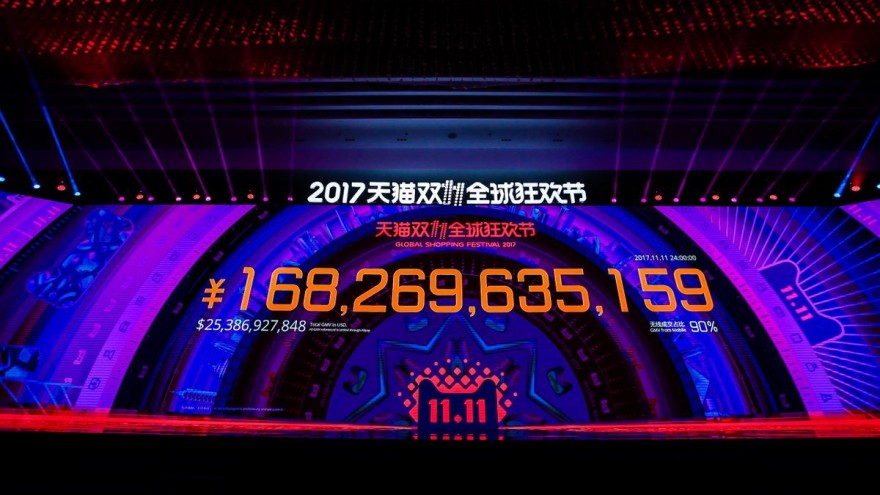
This year, Alibaba’s Singles Day Shopping Festival (also rebranded as double 11 Global Shopping Festival) entered into the ninth year. In 2009, retailer Alibaba turned the day into Chinese version of Black Friday. And eight years later, November 11, is becoming the biggest 24-hour online shopping festival on earth. Sales from Alibaba’s one day event has nearly doubled those from Black Friday and Cyber Monday in the US combined.
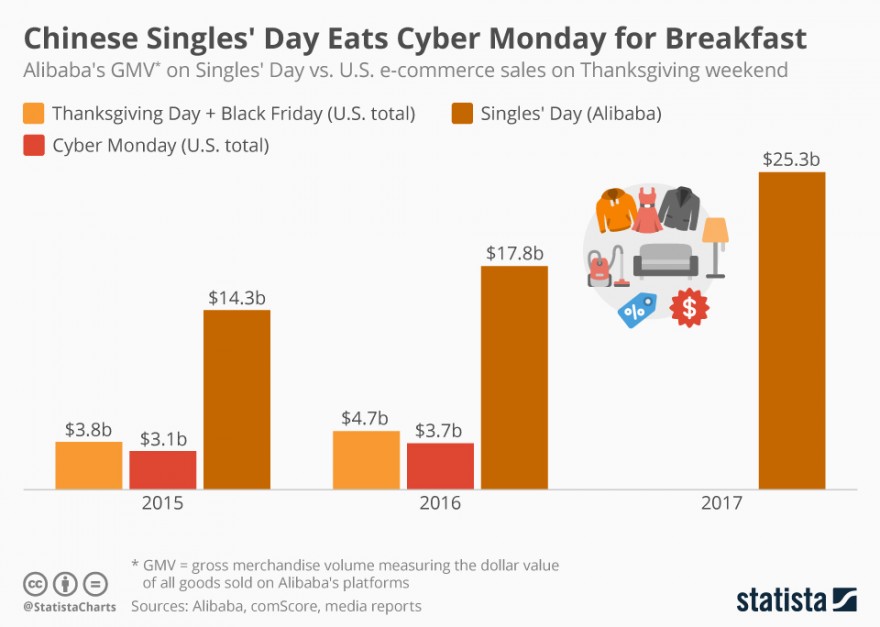
“Retail as entertainment” is one of the hallmarks of Singles Day. Alibaba is creating new sales record each year since 2009. In October last year, Jack Ma put forward the concept of “new retail”, which uses big data to seamlessly integrate online and offline activities. At zero hour on the day of November 11, consumers from China and other countries were all rushing in. Within 24 hours, they splurged on record-breaking $25 billion of purchases, a nice 40% increase from last year. As Alibaba’s CMO Dong Benhong said, not only we create consumer miracles, more importantly, the massive orders, the enormous amount of consumer data is captured. These real numbers provide data support for our next year’s business plan.
Here are some mind-blowing figures that sum up 2017’s Singles Day Global Shopping Festival:
$25.3 billion sales within 24 hours.
Alibaba smashing its own record from 2016 ($17.8B in year of 2016). The number reached as high as $5 billion in the first 15 minutes. In comparison, the total sales of Black Friday and Cyber Monday combined in the U.S. was only $6.79 billion in 2016. Behind this number, Focusing on providing a personalised experience and intelligent recommendations for consumers may have contributed to their success. Alibaba also said it had turned 100,000 physical shops around China into “smart stores” for this year’s global shopping event.
15 million products listed.
Over 60,000 global brands participated on this year’s “shopping party”. Familiar brand names such as Lululemon, Nike, Gap, Mac, and Macy’s. Products from US, Australia, Germany and South Korea were among most loved by Chinese consumers. In regards to what consumers actually bought on the day, baby milk powder, diapers, multivitamins, and other wellness related products were on the top of many people’s shopping list. As it is well known that health and safety are the top concerns of Chinese consumers.
90% mobile transactions
1.48 billion transactions were processed by Alipay, with 90% were done through mobile phone and tablets. Last year, mobile payments already accounted for 82% of Singles Day’s sales. In comparison, only about 30% of shoppers on Black Friday used mobile payments last year. China’s mobile payment system is more sophisticated and way ahead of many western countries. A great majority of Chinese consumers leapfrogged the era of desktop computers, moving straight to smartphones/tablets. It allows them to embrace Alipay’s convenience when making purchases through their devices.
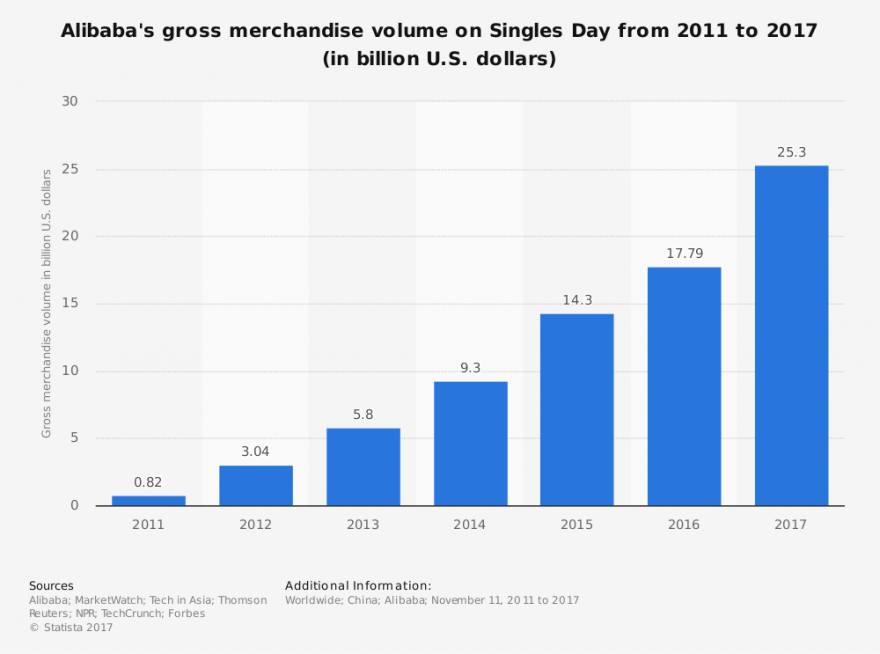
Summary
What truly sets the Single Day Shopping Festival is how Alibaba is leveraging its innovative technology combined with the scale of Alibaba’s entire ecosystem. It brings the future of retail in reality for Chinese consumers. With global trade closer than ever before, there has never been a better time to learn from the increasingly innovative retail landscape in China and to embrace the opportunities it presents.
The total retail market in China was nearly $5 trillion in 2016. By 2020, China will account for about 60% of global e-commerce. For consumer products companies, winning China means win the world!
Finally, here is a famous quote from Jack Ma, Alibaba’s founder. “Today‘s competition is brutal, tomorrow is even more brutal, but the day after tomorrow is beautiful. Most businesses die tomorrow night and can’t see the sunrise of the day after.”






